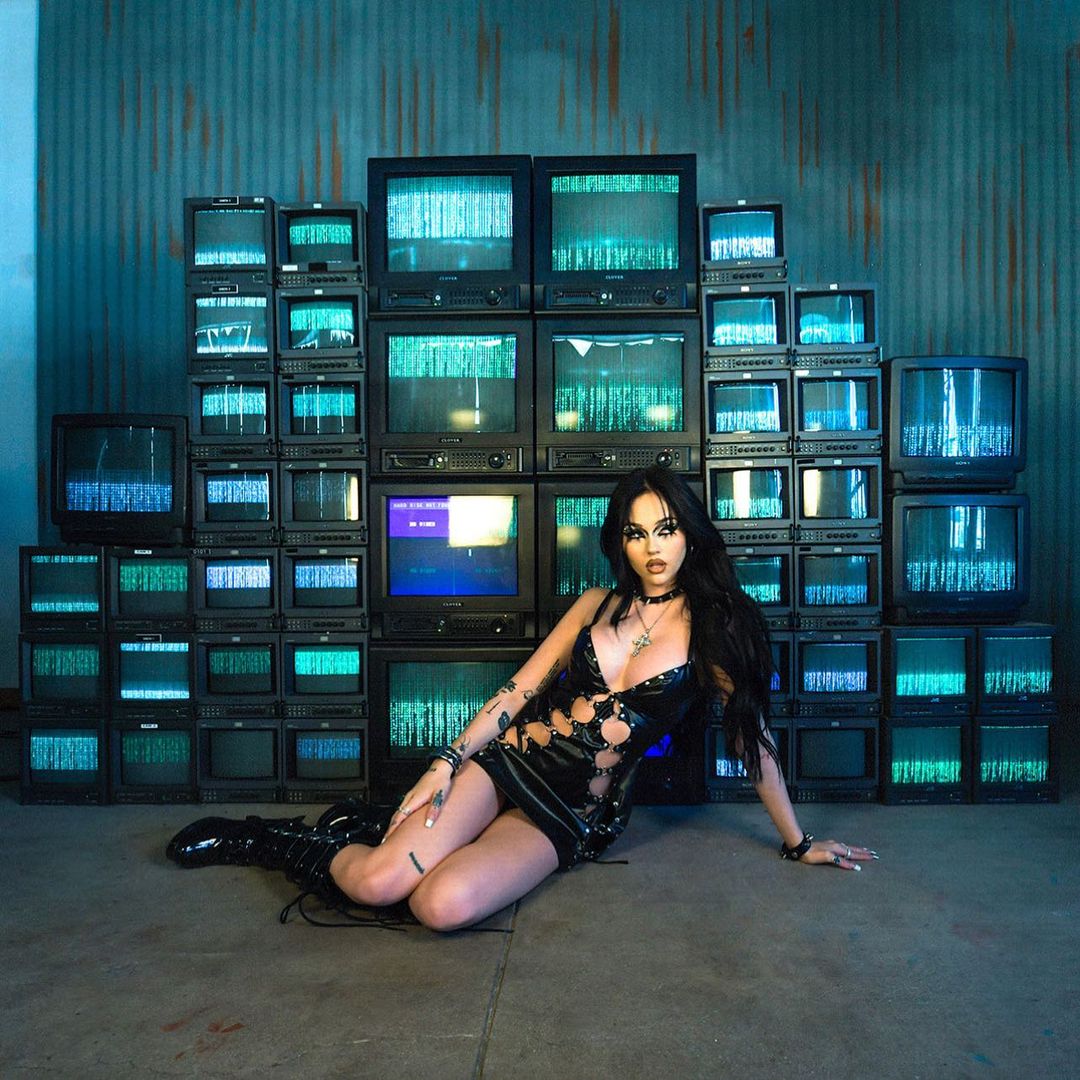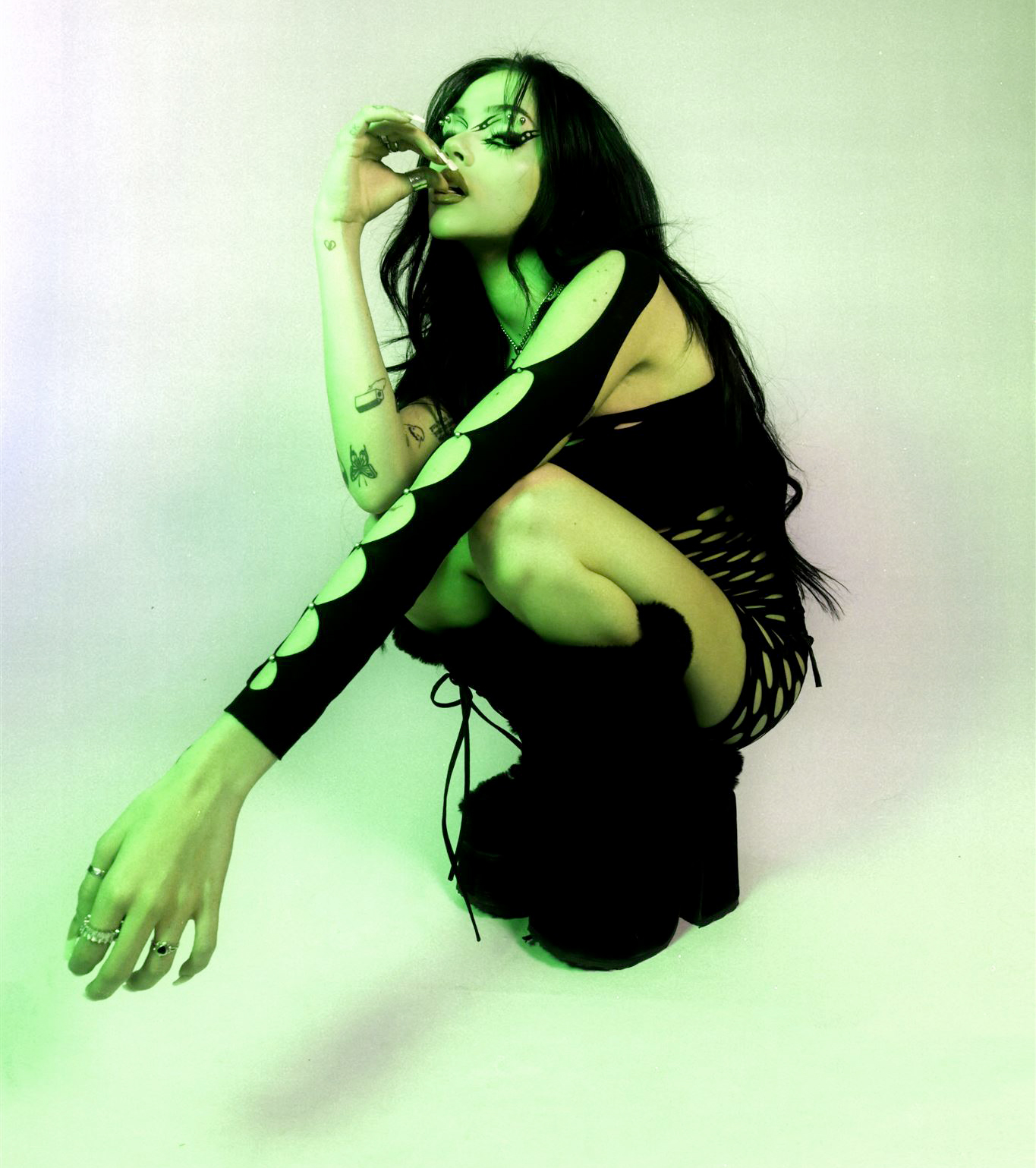Making the jump from pop to pretty much any other genre can be daunting, but Maggie Lindemann’s transition from bubblegum princess to alt-rock sensation was seamless — despite being seven years in the making.
“I kept writing songs, making new songs, and trashing everything,” Lindemann says over Zoom from New York City, where she recently played a headlining show. A line of devoted young fans snake around the block, ready to see the influencer-turned-rocker who they’ve followed on social media for years. Many wore outfits similar to the new rockstar — bondage-inspired pants and teeny tiny crop tops.
Lindemann, 24, gained millions of followers as a teenager on the now-defunct social media app Vine and then Instagram. She quickly became known with Gen Z for her pouty selfies, singalongs, and neon short shorts after posting a stop motion video to Maroon 5’s “Moves Like Jagger” that hit Instagram’s also-now-defunct “Popular” page.
“Social media was my person,” Lindemann says of growing up online. Instagram offered an escape for the then 14-year-old but came with its complications. “When I was in high school, I didn’t really have a lot of friends, and social media was always my best friend, literally. I would go to social media for advice for everything.”
However, not all of her experiences were positive.
“A lot of people that go to social media for that escape were bullied or weren’t cool in high school, or middle school, or whatever grade you’re in,” she says solemnly. “And for me, being on social media made it even worse. I had friends online and people who were there for me, and then I would go to school and it was the complete opposite reaction from people, which was really difficult.”
These days, she deals with fewer online bullies — especially since many of her 6 million followers have matured with her. “People are saying mean stuff, but it’s more trolling than it was when I was young. I remember people would say crazy shit [like] ‘kill yourself’ [or] ‘drink bleach.’”
Despite the abhorrent messages, Lindemann stuck with posting on social media and started making music — and her fans stayed by her side. While waiting for their response to new projects is “nerve-wracking,” it hasn’t stopped her from consistently moving forward as a musician and experimenting with new sounds.

She moved from Dallas to Los Angeles to pursue a music career, releasing the pop single “Pretty Girl” in 2016 (think Madison Beer or Selena Gomez) and then “Friends Go” with Travis Barker in 2019. More recently, she followed up the singles with Paranoia, her much darker 2021 EP with songs like “Knife Under My Pillow” and “GASLIGHT!” before putting out her debut album, SUCKERPUNCH, on Sept. 16. While her previous tracks varied by genre, her first full-length delivered a pop punk record evoking Evanescence or the Pretty Reckless with Lindemann’s sweet voice singing and sometimes screaming over guitar-driven rock. It’s a sound almost unrecognizable from her pop beginnings.
“I never really wanted to do pop. I didn’t really want to make the music I was making,” she admits, calling it “something that just happened, and I went with it.” For her, the “real switch” happened after a transformative experience when she worked with Barker on her energetic, ska-tinged 2019 tune.
“I just wasn’t really happy with anything I was doing, until Paranoia,” she admits. But even SUCKERPUNCH took quite a while to get right, with Lindemann describing the seven years since her debut track — all of which was spent making sure each single sounded like her. “It took a year to write this actual album, and then I wrapped it a couple of months before it came out.”
Citing influences like Paramore, Poppy and Bring Me the Horizon, the release of SUCKERPUNCH also allowed Lindemann to shift from a longtime opening act for Sabrina Carpenter, The Vamps, Madison Beer and more to a headliner. “It’s cool to see the different energy of having your own show, rather than opening for someone,” she praises.
Despite dealing with nerves, the naturally introverted artist has found that playing headlining shows has offered a respite from some of the apprehension, as she’s no longer wondering if fans are there to see her. In the past, opening for other artists on tour made her “a little bit insecure” because “not all those people are there for me.” Now, Lindemann can give longtime fans her “full personality” and the most “authentic version” of herself on stage.
“My sound is completely different than when I first started,” she says. “I definitely feel like I’m just more in my craft. I have more confidence in what I do now.”




